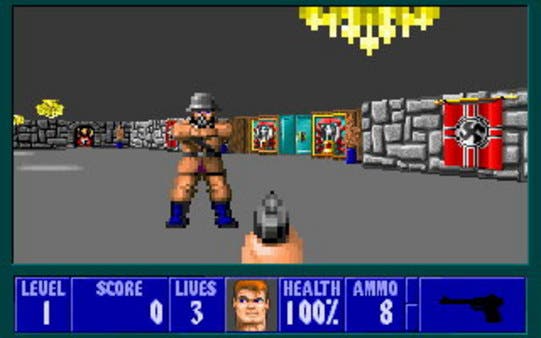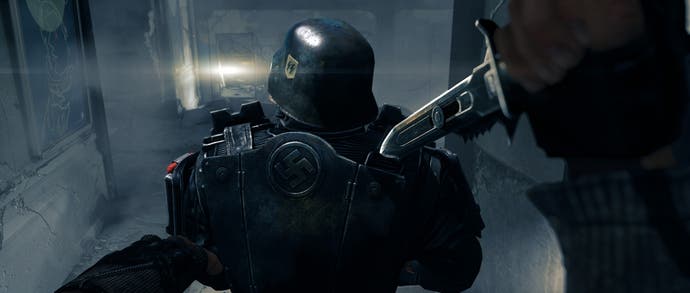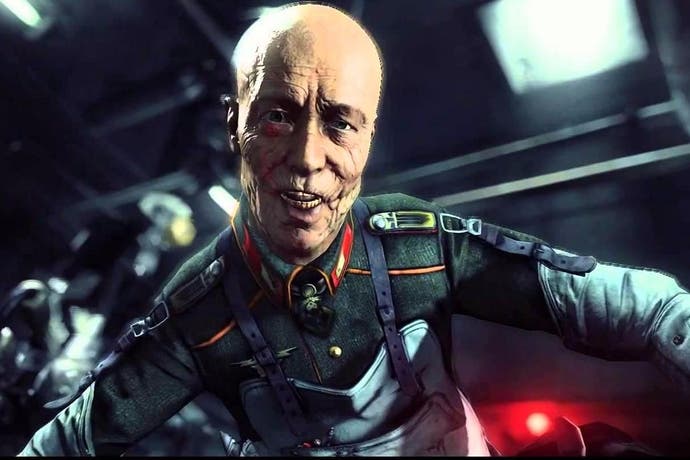Punching Nazis
How do you fight an ideology?
I've been calculating the number of video game Nazis I've killed. I never played the original Wolfenstein, but I've done my time in various Commandos and Medal of Duty and Call of Honors. I spent twenty hours in Saboteur making things next to Nazis explode, and that was a pretty efficient ratio of time spent to Nazis killed. So I think it's probably between three and four thousand. In terms of imaginary body count, I've probably pretend-killed as many Nazis as I have Zerg.
Why are Nazis so popular as enemies? The obvious answer is 'because they murdered innocent people on an industrial scale', but there isn't really any correlation between the part someone played in history, and how often they show up in video games. Stalin, Genghis Khan and King Leopold of Belgium also murdered millions of people, but they're much rarer as enemies.
No, it's the branding. You put a tin hat and a swastika on someone, and they're certified evil. You put them in an SS greatcoat, and voila, they're a miniboss. You put someone in the uniform of the Force Publique, the Belgian mercenary corps which killed ten million civilians in the 1890s, and everyone will go 'wot? why is he in a fez?'
So they make wonderfully recognisable video game enemies. The thing about video game Nazis is that, like all video game enemies, they are designed to be punched. They have many useful features in this respect. They're designed to lose a fight when engaged intelligently; they stop bothering us when we reach the end of the level; they don't have access to quicksave. (And they don't have families or real lives or secret Resistance sympathies, but that's a point I'm not going to touch today.)

But none of these things, annoyingly, are true of real Nazis, or their ideological heirs. And that - as you might have guessed - is why I've brought this up.
On the day of Trump's inauguration, Richard Spencer was interviewed by an Australian TV crew. Richard Spencer, if you don't know the name, is a white supremacist and neo-crypto-Nazi who styles himself 'alt-right', and has won some success by being more articulate and better-dressed than most skinheads. He had just claimed unconvincingly that his supporters weren't Nazis; he had just been embarrassed by the interviewer asking about his supporters shouting 'Hail Trump! Hail victory!' and giving Nazi salutes. They'd just got on to Pepe the Frog.
Then a black bloc (violent, disguised, anarchist) protester ran up and punched him. The whole thing was caught on video. And the internet immediately lit up, as thousands of people delightedly celebrated the #punchingnazis hashtag, reassured each other that punching strangers in the street is OK if they're Nazis, and started generating remixes of the video set to music. A striking number of those remixes cast Spencer as a video game villain. Which is why I'm here.
Spencer isn't a video game villain, so the punch has been pretty good for him. He's exchanged some mild facial bruising for a couple of thousand new Twitter followers and front page news on the New York Times and Washington Post. (Honestly, if anyone can offer me that much press in exchange for a punch in the face, please get in touch! As long as I don't have to say anything fascist.) And he keeps on sharing footage of the video online. Why's he doing that?
He's doing that because violence against neo-Nazis inside peaceful democracies is what neo-Nazis want. Neo-Nazis are big fans of violence, because their actual arguments are rubbish. They want to present themselves as victims so they can get sympathy, which is otherwise very hard for them to get except from people who are already also Nazis. Punching a video game Nazi makes him go away. Punching a real-world Nazi makes people who see the punch - people who aren't Nazis, but maybe have some dodgy ideas - wonder if actually the Nazi has a point. And that's where we start getting into trouble.
"BUT WHAT ABOUT THE SECOND WORLD WAR, ALEXIS?"
The Second World War wasn't something we did to the Nazis. It was something the Nazis did to us. It was a war of aggression waged against democracies. The democracies fought in self-defence, and that self-defence was horribly ineffective in preventing genocide. Two-thirds of the Jews in Europe had already been murdered by the time the Allies liberated the camps, and most of the rest had fled. I'm bloody glad the democracies won, but the war was a desperate last measure and the star catastrophe of the twentieth century. Any solution that requires the deaths of sixty million human beings is not a solution we want to return to unless as an absolute last resort.

And more importantly still, the political struggle against Nazism - the use of free speech to defeat odious ideas - was won by politicians and activists against the fascist movements in every Allied country before the Second World War even began. Without that, we'd have been stuffed before the war even began. Imagine if a pro-fascist movement had come to power in the US or the UK, and one or both had stayed out of the war. Right now, there'd be Nazis in Westminster gleefully agreeing that punching is the best way to deal with liberals.
You can't punch an ideology to death. Ideologies, even vile and stupid ones like fascism, are famously resistant to being punched. But when fascist arguments are exposed to common sense and daylight, the audience can see them as the evil bollocks they are. And this is the other big difference between video games and life: in a game, you're both the player and the audience. There's no-one else to convince. In life, when you argue with a fascist, it's the people watching that you have to convince. Convincing the fascist is a very rare bonus. If you punch the fascist, you're telling the audience 'my arguments weren't good enough to win!'
Let me give you some examples.
The first is the Battle of Cable Street, when anti-fascist protestors physically prevented fascists from marching through the East End of London. It was a fondly-remembered morale victory for anti-fascism... but as Daniel Tilles points out, it gave the British Union of Fascists a tremendous boost. They could truthfully claim that they had been attacked while exercising their right to free speech, and that police officers had been injured in their defence. Their London membership went from 3000 to 5000 in the weeks after the Battle. Special Branch were keeping a close eye on the BUF, and their report at the time concluded: 'The alleged Fascist defeat is in reality a Fascist advance.'
But two years before, anti-fascists peacefully (if loudly) disrupted a BUF meeting, and the BUF stewards beat them up and threw them out. Back then, the anti-fascists could truthfully claim they were the victims of violence, and public opinion swung against the fascists. The Daily Mail, which had run headlines like 'Hurrah for the Blackshirts!', stopped supporting them. In a peaceful democracy, throwing a punch isn't a recipe for political success. It's a trap: a way to lose sympathy.
And, of course, the most striking example of anti-fascist violence gone horribly wrong occurred in 1933 in Berlin. Hitler had been elected Chancellor, but, crucially, the Nazis hadn't won a majority, and their power was limited. Just before an election, a left-wing activist set the Reichstag - the German parliament building - ablaze. He did this specifically as a rallying cry against fascist rule.
Here's how that rallying cry worked out. Within a week, Hitler had asked for, and received, emergency powers, and was able to suspend the rights of free speech and free association. Within a month, the Nazis had convinced undecided voters that there was a Communist plot afoot to take over Germany, and had won a majority in the election. The next twelve years didn't go well.
I want to give the nearly-final words to Nitzan Lebovic:
"Violence from opponents of fascist regimes usually gives more intense, overt power to that regime[...] In any of the cases I know, it plays right into the hands of the regime, and is used as an excuse to harshen the punitive measures against critics. It doesn't benefit those who are interested in democracy."
Who's Nitzan Lebovic? He's Chair of Holocaust Studies at a Pennsylvania university and, incidentally, Jewish. I'm pretty confident he's not a big fan of Nazis.
When you punch a fascist, it's as effective as throwing Brer Rabbit into the briar patch. When you actually debate a fascist, their arguments fall apart like badly thumb-tacked MDF. Video game solutions don't work in the real world. Boring solutions work in the real world. This is literally why we have video games: if we could easily make bad things go away in the real world by punching them, we'd all be out there doing that, right now.

